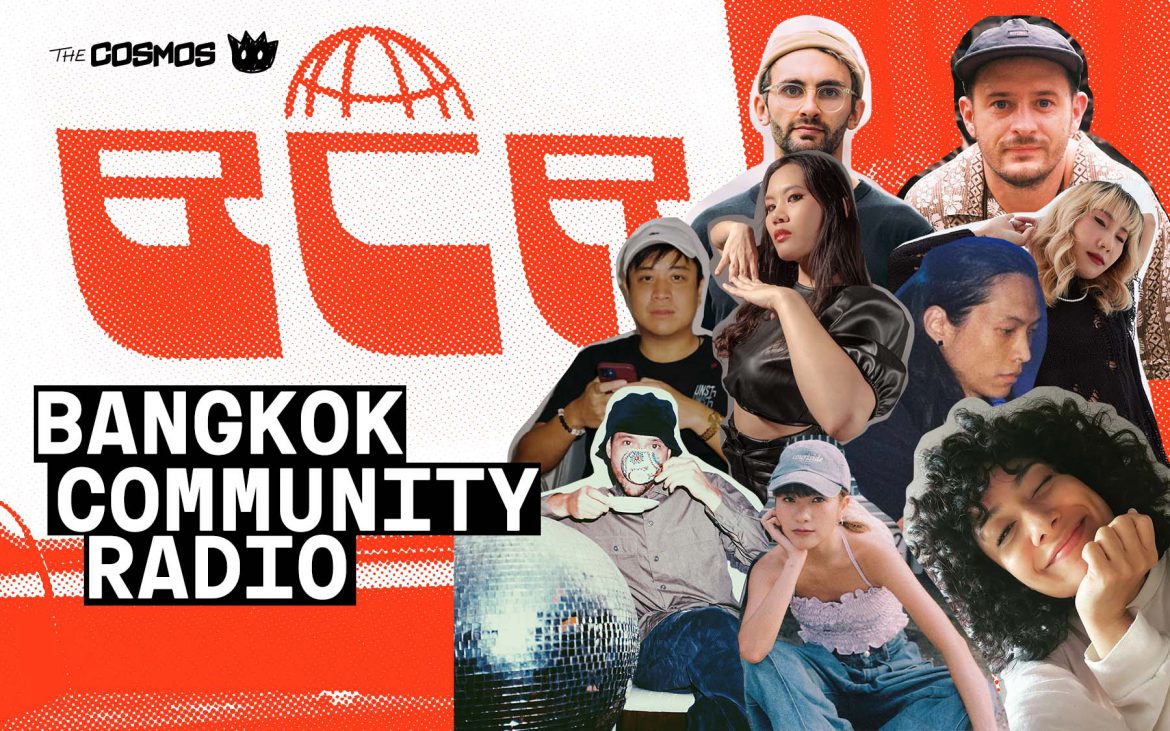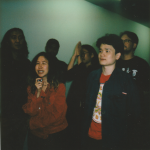Bangkok Community Radio is one of only a few names in the online radio platform community in Thailand that is still actively releasing consistent shows every week. The hosts and resident DJs are familiar faces behind the decks of Bangkok’s most prominent nightclubs, but the difference is— when broadcasting on BCR—they have the opportunity to explore and share their musical passions with listeners and not just the more automatically crowd pleasing the clubmixes from their gigs on the club scene.
In this COSMOS Creature, we have Frank ‘Vell’ Nankivell, Sarayu ‘Jay’ Sriyuksiri, and Chucheewa ‘May’ Cheepchol, the masterminds behind this community radio platform, to tell us more about their goal; to showcase undiscovered local artists and invite more players to the Bangkok scene. And also, BCR seeks to support the constantly growing local scene as it seeks to be seen, recognised and heard as a rising international clubbing destination.
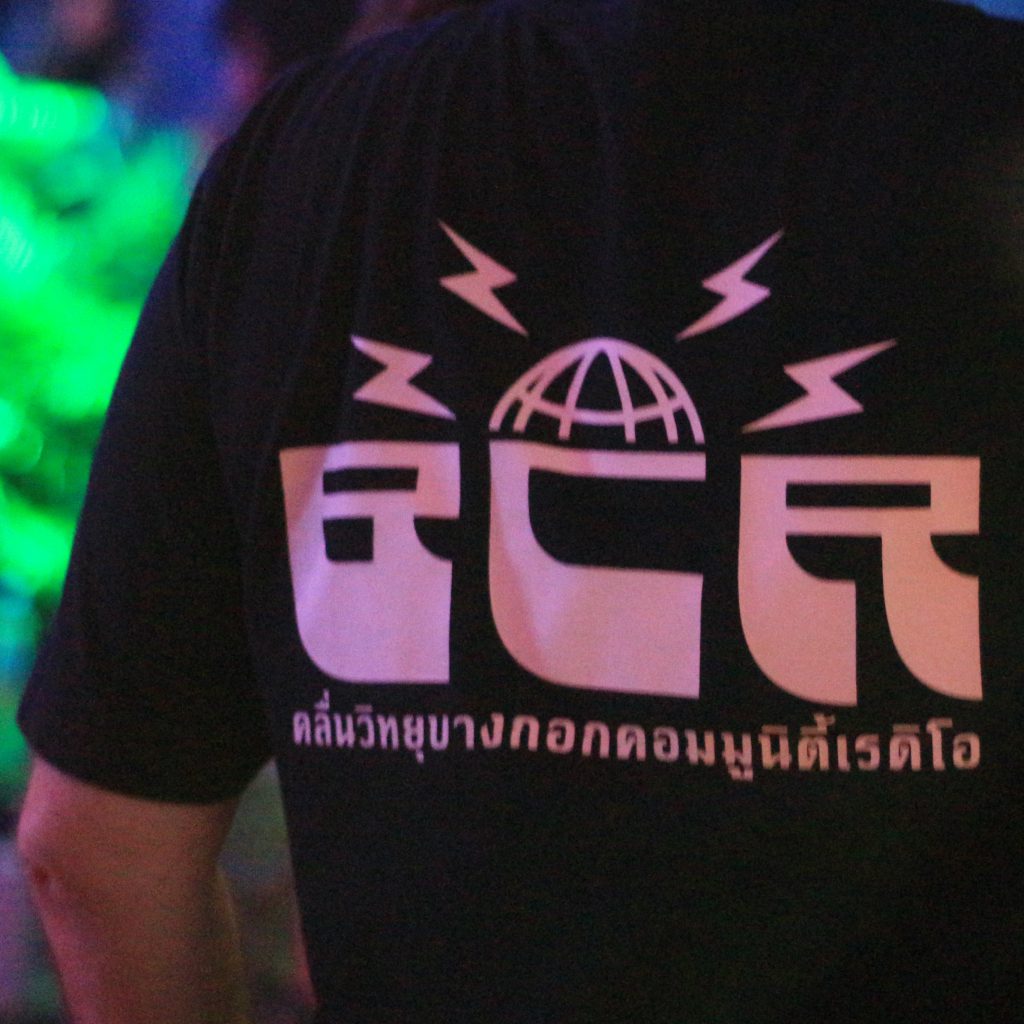
When did BCR start and with what purpose?
Frank: We started in COVID and it was mainly Liam (Seelie) from Transport, Jay and Top (DOTT) from More Rice and myself got together. It was a project to help support music and give people a bit of a platform throughout COVID and the social distancing period when clubs bars and events were all shut down. It kicked off, probably the end of the first year, as we didn’t know how long COVID was going on for. Also looking around and seeing the limited amount of Thai or Bangkok regional online radio, we saw a model that worked very successfully both in Europe or other regional areas such as South Korea like Seoul Community Radio. We started chatting about it as an idea and that’s generally the history of it.
Since then we’ve grown the team, we have Takky and May (Chucheewa), Tharika and Brent Burns join us, and give us a lot of bandwidth with both different connections and different skill sets within the team. And late last year we moved into Entertainment Project, and then we’re taking on paid staff like Yok (Gayath) as a producer and Aadit (HI[GH] HAT) for graphic design work. So that’s kind of where we are now, and obviously the plan is hopefully to grow and expand the team with more paid roles and hiring more staff to be in the studio, or working on events, moving from a voluntary community to a more professional community that can set the cost for the next few years. People who work here should get paid, right?
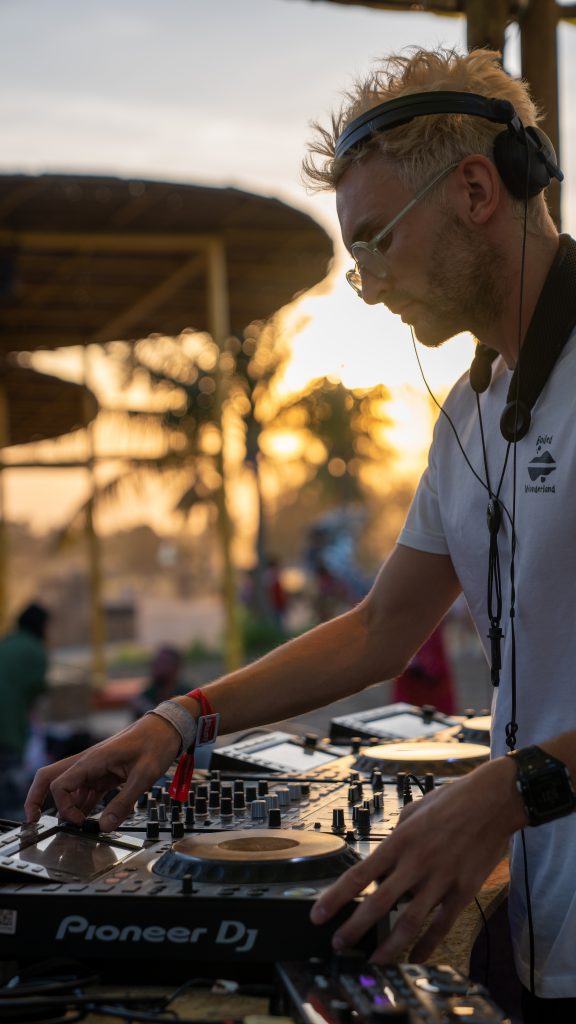
How will you make this ecosystem sustainable?
Jay: I think the main goal of community radio, for us, we’re in agreement that we’ll work with the mindset that it is the community, so it will take time. Sustainability wise, to keep everything going like a bar, taking stuff for ourselves. We’re working on different projects with different people and being more like a creative agency, I don’t know if that’s the right word. So curating different venues and places like that.
Frank: We collaborated with events like what we did in Maho Rasop, Bangkok Design Week, and we do a few different bars in Bangkok like Entertainment Project, the first event of BCR, start to do like a little bit of sponsorship stuff, so we’ve got like a partnership with solid brands like AIAIAI which is kicking off moment with the headphones and we’re gonna do few things with them over the course of the year. So I think the idea is like Jay mentioned, more providing our brand to access the other brand or interesting market, getting more opportunities.
Jay: Yeah, like we’re hoping to do more activation work for this kind of brand, but obviously, it’s a slow process here. Because in Thailand a lot of brands are pretty tough for sponsorship, only the product but not the fundings.
Frank: There’s another couple of ways that people run the radio and one is like subscription. Go back to underground radio where it used to be like there’s no way you can make money from this. Like illegal underground radio. People would pay for the subscription, maybe like a few pounds, and they could go there to do the dj. The other one is like a funding model, like you got a grant from the government, a charity or sponsorship. I think, in Thailand, when we talk about it, this option is the one with the biggest challenge other than the subscription model. But also for the subscription, many artists who are not from a privileged background would not be able to be part of the radio. Really, the focus of BCR is to provide opportunities for up-and-coming Thai artists, and the idea of maybe having to pay 200 THB a month could certainly be a turn off for them to get into music. There’s a lot of conversation in the group about doing things that make things financially worthwhile, because people work for free or pretty lowly. Then you do an event that doesn’t raise any money for different people so it’s quite the hard thing. So this is about negotiating it in the right way. That’s why, at the moment, we are focusing on working with sponsors, but maybe we will need to explore some other options in the future.
How do you select or curate the artist to play on each episode? Can anyone submit their mix to the program?
Jay: With curating the artist, we try to be always inclusive. We try to get the variety lineup of the DJs so I think we’re pretty cover for the most genres. If it’s my own show, which I rarely do any shows for BCR, but I don’t want to do only dance music because actually I listen to a lot of stuff. So I’d like to play the stuff I don’t use to get to play. And I think that’s good because a lot of artists, I guess, use this as a platform to be able to do other stuff as well, and it gives us more variety for the radio.
Frank: If you are a musician or artist living in Thailand, then yes, you can get in contact with us and we can sign you up as a resident. Our broad rule is that you need to be living in Bangkok/Thailand or living overseas as a Thai national. It’s not a hard and fast rule and sometimes we have had residents who are international and used to live here, but then moved away and still submit shows. But we wouldn’t choose to sign up someone who had no connection or relationship with the city. We ran some statistics recently and roughly it’s about 80% Thai nationals in Thailand or Bangkok and around 10% like international and maybe 10% live overseas. We definitely don’t have musical style but some types of music we like less, like if it’s extremely commercial EDM maybe we wouldn’t choose that type of show. I guess partially, as we’re curating music in the scene around the type of music in Bangkok.
May: We’re not the platform that only channels dance or electronic music. We try to invite, for example Beam Wong, a live ambient artist to do his own set and I find it’s very interesting. And I found many DJs who did the party but for the BCR set, they also have songs they like to listen to at home. It helps listeners understand that it’s not just dance music, but everything if it’s not too commercial, which is the core of why we’re doing community radio. We’re pretty open with all kinds of genres.
Have you ever collaborated with other community radios?
Frank: We’ve done a few. We did something with UK radio a year ago called Thread to do online collaboration. Then a little thing with Bali radio, Headstream, last year. And will do with FM BELOWGROUND Hong Kong. (May: We did one with SCR, Seoul Community Radio.) We hosted them over and shared it online, it was nice having them come over.
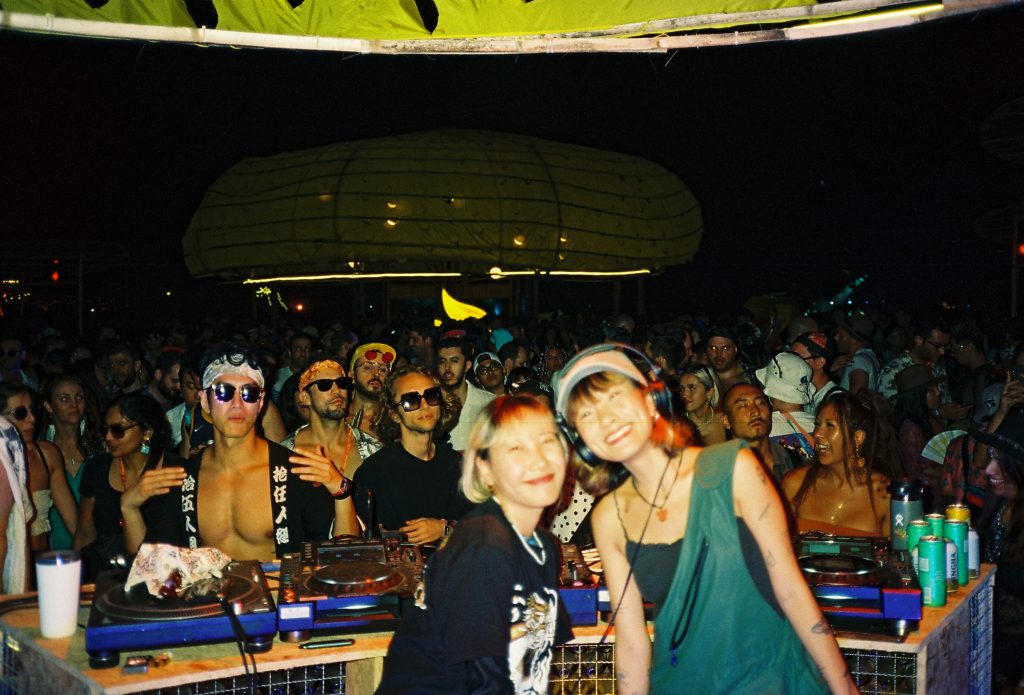
Do you think Thai artists are being seen more from these collaborations?
May: I think it’s helpful, for example, there are artists who happen to be good DJs but they’re only doing it at home. (The COSMOS: How did you find them?) Sometimes through friends or they just asked one of us. We tried listening to their sets then we invited them over to become our hosts. And because we put all the mixes on Soundcloud, I think that’s also helpful since they can have their first proper set recorded. So whenever they want to start a career at cafe, bar, or restaurant gigs, they can send this set as their portfolio.
Frank: It’s not just people from nowhere getting gigs in Bangkok, but also getting regional bookings. I’ve seen them grow as the result of the exposure. Someone like Issasha who was obviously a dj before BCR, but she’s been militantly putting the show on regularly every month for the past 3 years. And I’ve seen her get booked for her shows at Zodiac in Jakarta that come through her 2 sets she’s made for the radio. And I think all of that flow basically is what we want, which is more exposure and a place for artists to get developed in their career.
May: So it’s not about you’re famous, well-known, or whatever, but if you have discipline and inclusiveness, they’ll try to make sure you’ll be seen and invite you to host if there’s an available slot.
Jay: Maybe I need to do more shows.
How does having the outlet upstairs of Entertainment Project change the ecosystem of the BCR?
Jay: A lot more people are asking for guests’ slots. They’re getting on my personal instagram DM as well.
Frank: It changes in many ways and that’s the obvious one. I think the whole thing has to step up. In terms of being like an organization, we have to pay staff, pay rent, we’re actually running the shop which is not making much money, and a lot of systems and stuff like place booking and in addition to that like validation of the music, and there’s a lot less opportunity for technical issues because it’s live and something can go wrong etc, etc. It’s needed (to step up) because we need to have the opportunity to grow and have that change.
The surprising thing is that the last couple weekends were pretty full the whole time. 12-8 pm Fri – Sun. Not so many residences have recording sessions but it was full of international guests, which is interesting. One of the reasons we want to open it is a lot of DJs like we’ve mentioned before, like someone who doesn’t have a system at home, doesn’t have decks, but a really keen and interesting musician, we wanted it to be a place for them to come and record their mix, to provide their opportunity.
Is it permanent up there?
Jay: Permanent-ish
Frank: We have a rental with Pang (Yellow Fang/ DJ Zombie) which is not forever. I think until around June we’re gonna decide if we want to move. It was obviously using a lot of energy to make the space look as it is. I think it’s nice to run for a year and see if it works, are we getting any value added to it? Do people enjoy it? And working on other details, which is tricky, but fun.
Obviously BCR is growing, but do you find anything still lacking in the Bangkok dance music scene?
Frank: It’s nice to see the scene is growing, but we have 10 million people and it would be nicer that we don’t have to really push to sell tickets for a really low price for the events. It would be nice if we have venues with flexible opening hours like the nightclub setup. As someone who is not from Thailand, I am always surprised by the limited market and venues. But as we’ve mentioned, it’s changing in a positive way because in 5-10 years it’s expected to grow and grow and grow, which is nice. I don’t know if we’re gonna do our own nightclub tomorrow, but it’s about supporting the night clubs, DJs, musicians that are doing the right thing and hopefully it’s working the right way I guess.
May: I wish we have more community ambassadors to be a bridge to bring more people like NOTEP or people who can expand so we can bring more people in this scene and have a more sustainable healthy community where people can do what they want and can support everyone without forcing.
Jay: We just got to see in a few years how this will grow. As we take a look at the art scene now, it’s pretty good, especially all the young guys. Like I said, they have a lot of passion and are very driven. So you see the fashion industry here, it’s pretty good. Creative industry is very, very striving here, so hopefully it will expand to music.
Frank: Again, like someone who isn’t from the country, the chance of music globally if you’re based in New York, Berlin or London and you’re a band, a DJ or an artist, you’re more likely to succeed if you’re around media company like agency, art space company, venues, big clubs, whatever whatever. It’s so much harder as a band or an artist to make it here, but we have seen successes with sales like the bands and also some DJs recently, and I think that hopefully will change.
But from a dj musical perspective, more DJs are making music because they think it’s the real pathway through, and I think it’s really hard to crack through. Although you can do it (DJ), it’s really hard without producing music, and making music. It also means a regional club scene here to be able to support people to grow internationally, which I also think it’s happening with going out to play in Vietnam, Hong Kong, but it’s about connecting and supporting artists to have the opportunity to do so. Like DOTT) or Sung Hargun or Sarayu start to have international bookings, but it’s about making sure the artists have a platform because it also puts you on the map as a country or place, and that also brings more international people through. And it’s the motivation for younger generations like 15 years old to feel like ‘Wow that person has just played at Coachella’ or other notable parties. Like being a headline can create that kind of effect.
May: I think it’s both pros and cons. If you talk about the European or The US scene, you have more industries to support this kind of music. But in Bangkok I think it’s kind of cozy and charming and a bit more intimate, which is special. It’s harder, but it also makes people try harder and the community is tighter. It’s the feelings and interactions that you won’t find in the huge industry out there. Let’s see what’s gonna happen in the future. Well, I’m excited.
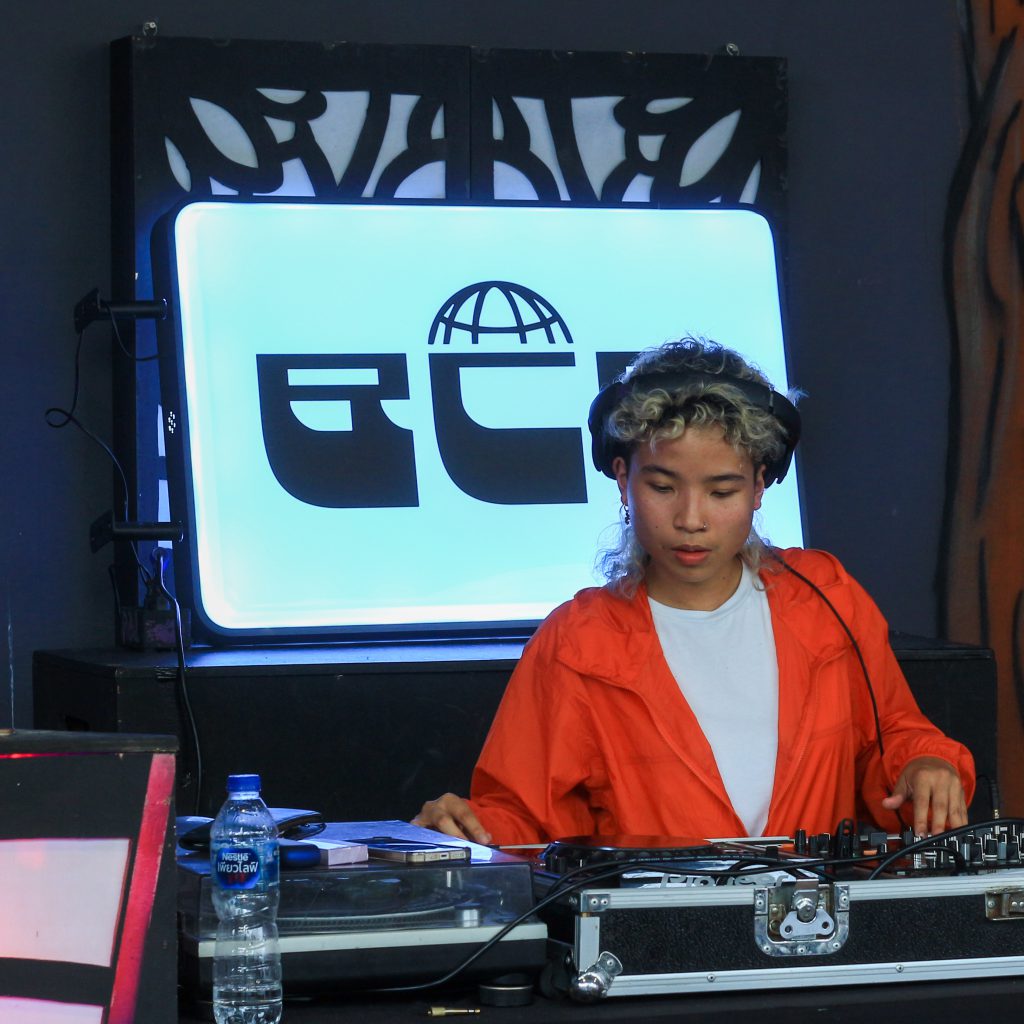
Do you think people nowadays are more open-minded about different types of music?
Jay: I think it’s getting better. I’ve been doing projects for about 11 years including before, and I think the scene has a much bigger audience here. I don’t know if the first time I saw you was our first party, which was back in 5-6 years ago, even since then, there were a lot more Thais coming to the party, so I think in general the younger generation pays a lot more attention to this. Maybe in the next few years, it will be bigger. I don’t think less people understand, instead a lot more, so it’s coming to be a good balance.
May: We used to be indie kids that only went to ambient shows or listen to band music. Then we have that one friend who happened to drag all of us to this kind of event. People are not open-minded. I think they do but they just don’t know. In the past, if you’re indie kids and you know someone’s gonna come here (clubs), they asked me ‘Are you going to an EDM party?,’ but it’s actually house or techno music. So we need that person who can be the bridge, the person that you trust in their tastes. You’ve never explored these types of music or clubbing culture but then you follow them to those parties and then you start to slowly understand it.
Frank: I think right now it’s more affordable and accessible so it’s like a challenge. This city has maybe like 10 million people, but most of the time we go out, we see the same faces. Even if we go out for different types of music like indie music or even the EDM party, you’ll still gonna see the small group of people that are actually going out spending their money on things. I know partially, maybe a million of people have this amount of income to go to the party, but 9 million don’t necessarily. They can’t afford 200 Baht coffee or something.
Jay: Though, the party is getting more expensive. 10 years ago the parties were cheaper. We went to GLOW and there was an international act that cost 400 THB, now it’s getting more expensive. But I do get your point that it’s more affordable, just the change of mindset right? If people are willing to pay and support it, it’s much better. The guest list things are now whole, a lot less kind of worry. Not so many people ask for it, especially the guys who run the parties themselves now more willing to pay for the other parties, which is good.
Frank: In the last 4-5 years, the whole industry of music has changed, especially dance music. 10 years ago you needed to put out the record, you needed to sell some records and make money from these records. That’s what international people coming through need to have the career than actually you can to make money from the record, so that’s the price globally going up, and I think Bangkok just fits within that thought at some point.
May: I feel that we need to reach more people in a way to make it sustainable. We understand that people in the community already understand this music, but sometimes these people can’t support every event. You just need someone to explore and find a new target. I started to see some groups of people who always go for commercial music, but now they find the vibes in our scene are nice so they try to come. There are always people who can afford it out there but they never get invited, and they think they’d never gonna like it or be interested in it before. If you can have more new people, it makes the Thai scene grow faster and better.
Tell us about the first ever BCR event?
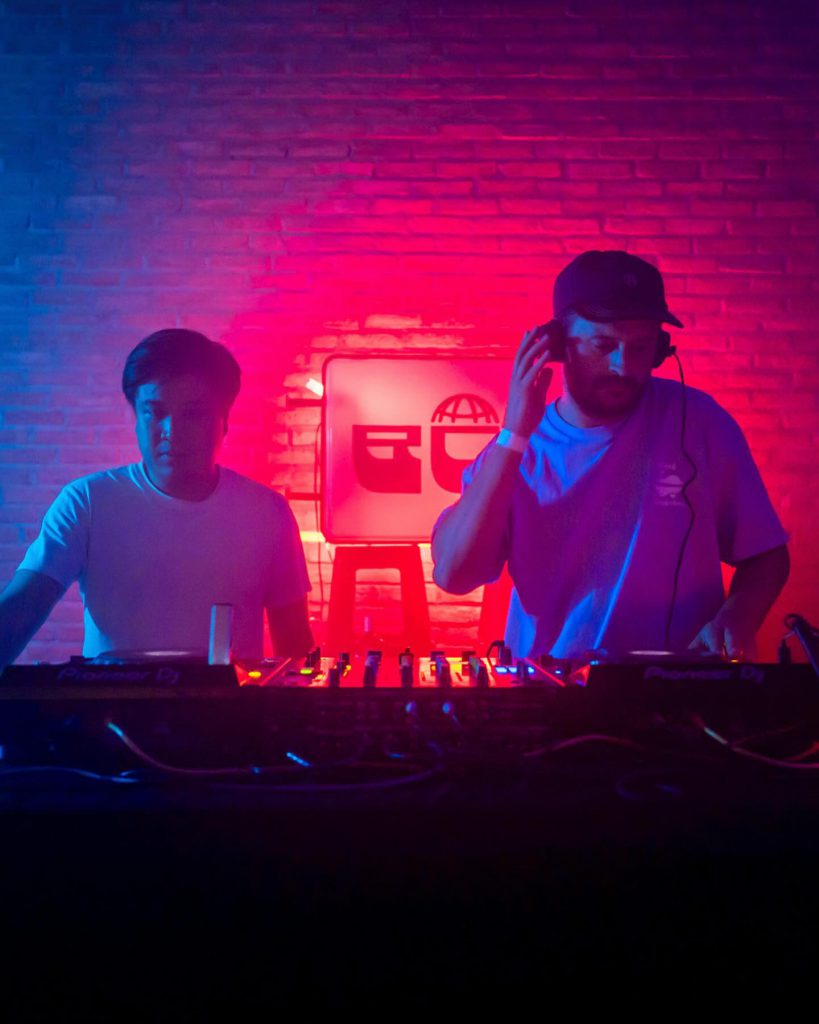
Franks: We are very pleased to be working with Ballantines’ this weekend for BCR Dance X Ballantines. They are a really renowned brand internationally and have done a lot within dance music so it felt like an obvious partnership together. It will be their first event in Bangkok but they have supported many Boiler Rooms before and have a set of values which is all centered on electronic music, and we are really looking forward to working with them. We will also be launching a small t-shirt range with them which we are also very happy about. This year we will be also exploring working with other brands outside of alcohol for events and are already having a few discussions for future partnerships over the next year.
Jay: First event that the team will be playing, right? My first time playing for BCR, too.
May: It’s my second time, but the first time playing as a team. My first time playing for BCR was when I wasn’t involved with the team. I was a guest who always submitted the show so they invited me. So this is more like a team of 8 people who’re working together.
Frank: So it’s good this will happen at Unformat Studio and people see the new venue outside of the center of Bangkok.
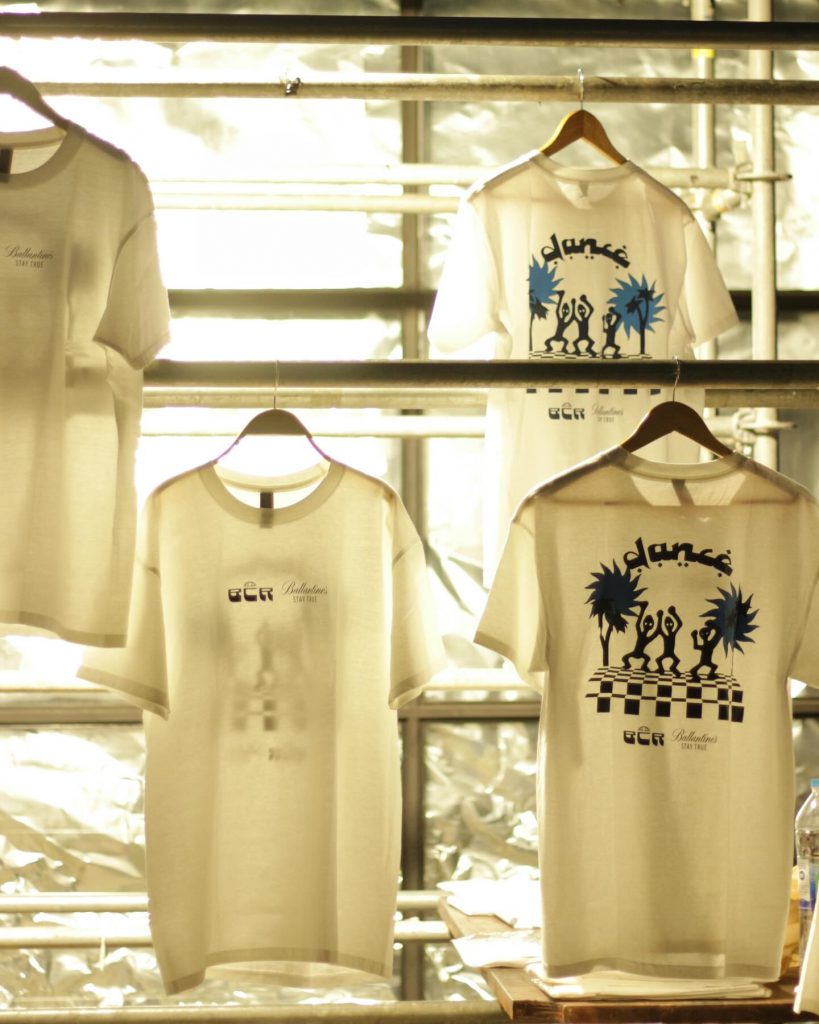
How did you approach and bring the first ever DJ event to Bangkok Design Week?
May: One Bangkok reached out to us and I think it’s nice. We can expand to more art people also in the government part that they might see this can be another community project that they’d be interested in funding in the future. They didn’t give us a crazy amount of curation fees, but it’s good to help support this radio to keep going. We put different genres of artists in there; we have 2 live shows from NOTEP and Chalo which are like different kinds of music. And NOTEP is really good to help with the reach for this community project like expanding in the bigger crowd in my opinion. So I think this event will help us expand a lot more audiences and the group of people. We’ll also have artists like Pam Anantr, Shir Khan, Yoongying & Krit Morton, Vell, Keith Edward, and Beam Wong playing throughout the whole week.
If there’s any people interested in submitting their mix set, what should they do?
Jay: if you want to submit or do any shows, contact us, we’re always looking for new artists. Or you know, directly contact Frank at music.vell on instagram. Or you can email our producer Yok at studio@bangkokcommunityradio.com
About BCR
Jay: Frank, he’s the one who’s working really really hard and May brings so many artists as well, Liam from Transport helped introduce and bring many artists. Most of the things I do is finance stuff. Counting the money and paying out
Frank: Well, it’s the collective team ever and whatever these guys say, everyone is like pulling their way in different ways and I think it’s obvious there’s still a lot of things you need to get it right. Still a lot of things we need to do better and grow the opportunity across many areas, but I think it’s been nice in the last few months to see how much impact the studio had or the changes had. I think it’s nice to see where BCR is in 2026 with a nicer studio. We can prove and test a sustainable model for the radio and also to see how the Bangkok community in terms of artists can grow as we thought.
May: I think we’re lucky cus we have this team as well. Everyone is important. Frank is like big fuel and I happened to be his neighbor, so I see this is almost his full-time job as he works really hard. Also before I joined, there were 4 of them which I think to start something new, you still need people like Jay, Liem or Topp, like everyone knows what they’ve been doing for such a long long time in the scene. So you have that trust for people to decide to join, like they would say ‘yes’ at the beginning once they’re asked to help the team. This is the key to make it the other way to grow. To make it happen. Brent is also the statistic guy who does the backstage but also works so hard. I find everyone in the team is doing their best for the community.
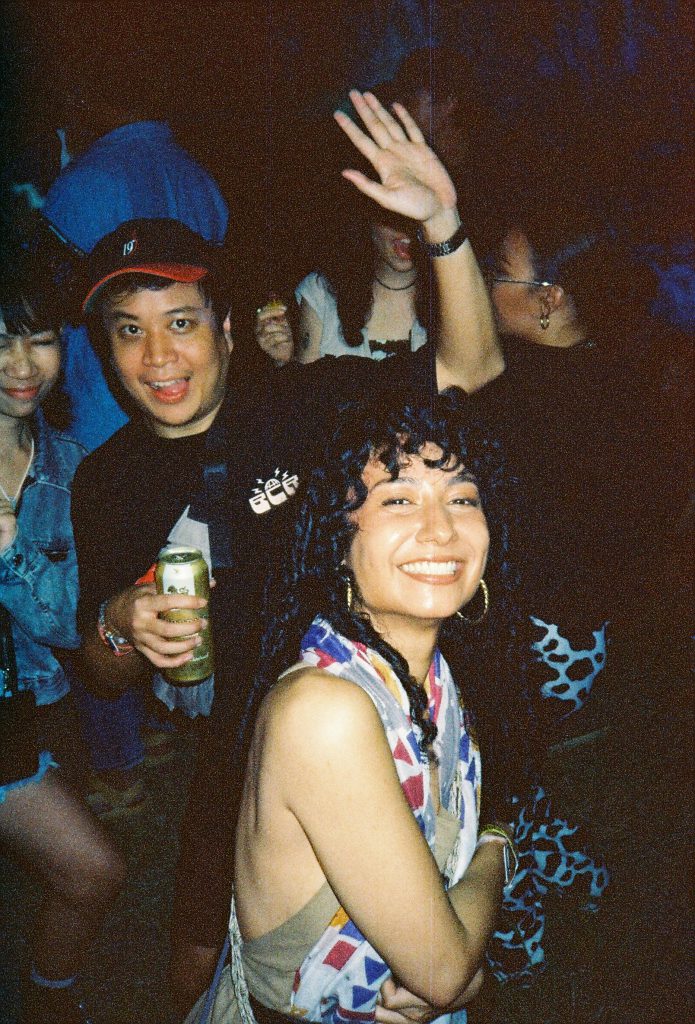
Bangkok Community Radio are:
Liam Rielly
Frank Nankivell
Brent Burns
Chucheewa Cheepchol
Vincentius Aditya
Tharika Maiwong
Pakarapol Anantakritayathorn
Sarayu Sriyuksiri
Thanapond Surakul
Ubonsiri Sooksuay

